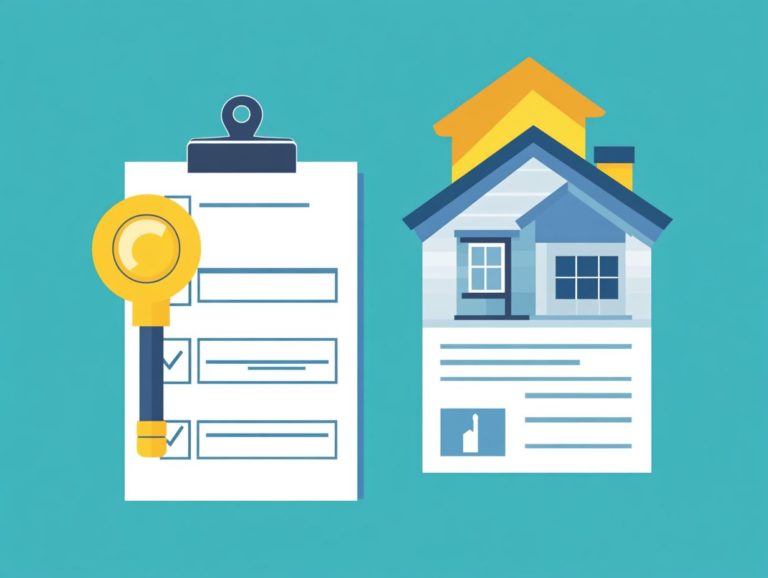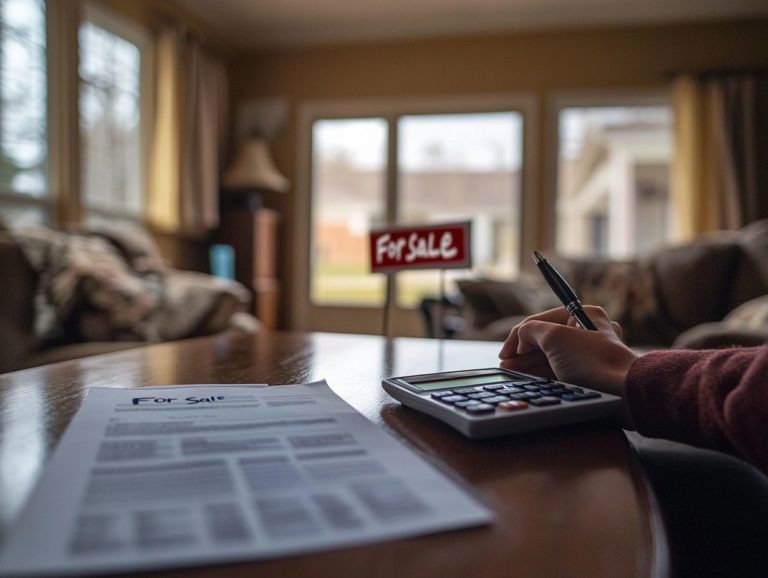What to Expect During the Mortgage Application Process
Applying for a mortgage might seem overwhelming, but grasping the steps involved can transform the experience into something far more manageable.
This guide will take you through the entire mortgage application process, starting with preparing your finances and gathering the necessary documents, all the way to submitting your application and navigating the underwriting phase.
You ll also discover what to expect at closing and pick up valuable tips to sidestep common pitfalls along the way.
Equipped with this information, you ll approach your home-buying journey with newfound confidence.
Contents
- Key Takeaways:
- Overview of the Mortgage Application Process
- Preparing for the Application
- Submitting the Application
- The Underwriting Process
- Closing on Your Mortgage
- Tips for a Smooth Mortgage Application Process
- Frequently Asked Questions
- Mortgage Application Process FAQ
- What can I expect during the mortgage application process?
- How long does the mortgage application process typically take?
- What factors can impact my mortgage application?
- Will I need to have a down payment for my mortgage?
- What if I have a low credit score? Can I still apply for a mortgage?
- What happens after my mortgage application is approved?
Key Takeaways:

Prepare in advance by gathering necessary documents and understanding your finances. Be prepared to provide additional information and complete the application form. Understand the underwriting process and what to expect after submitting your application.
Overview of the Mortgage Application Process
Navigating the mortgage application process is a journey filled with both excitement and challenges for buyers and sellers alike. It encompasses several critical steps, such as securing pre-approval, gathering financial information, and gaining insight into mortgage rates and loan terms.
For first-time home buyers, having a solid understanding of this process is essential. It allows you to accurately assess your budget constraints, manage closing costs effectively, and ensure compliance with underwriting requirements.
Each step in this intricate dance is interconnected, influencing the overall timeline and success of obtaining a mortgage, from the initial application to that all-important final closing meeting.
Step-by-Step Guide
The mortgage application process can be navigated through a detailed step-by-step guide that offers clarity and direction. This ensures you, as both a buyer or seller, understand each component from pre-approval to closing.
This structured approach gives you the power to methodically traverse various stages, such as loan processing, underwriting, and grasping current mortgage rates. Ultimately, it aids you in making informed financial decisions.
Starting with pre-approval, gather essential documentation like income statements and credit history, which lenders will evaluate to determine how much you can borrow.
Next, during the loan processing stage, collect additional financial information and property details. This lays the groundwork for the critical underwriting phase.
During underwriting, lenders assess risk based on your credit score and debt-to-income ratio (the amount of debt you have compared to your income). This will influence the loan terms they offer. It’s crucial to know how changing mortgage rates affect your monthly payments and overall loan costs. This knowledge gives you the power to choose the best time to lock in your rate and move confidently toward a successful closing.
Preparing for the Application
Getting ready for your mortgage application is crucial! Organizing your financial details carefully will set you up for success.
Establish a realistic budget that factors in the down payment and earnest money, ensuring you meet the lender s criteria and secure pre-approval.
This groundwork lays the foundation for a successful mortgage application process, giving you the power to approach house hunting with assuredness and clarity.
Gathering Necessary Documents
Gathering the necessary documents for your mortgage application is a crucial step. This involves compiling essential financial information, including income verification, credit reports, and asset documentation. Lenders require these documents to assess your financial stability and ability to repay the loan, which is pivotal in the underwriting process.
To ensure a seamless application experience, it s vital for you to include specific documents, such as:
- Your most recent tax returns
- W-2 forms from the past two years
- Detailed bank statements that accurately reflect your current financial situation
Providing proof of assets like investment statements and retirement account balances can strengthen your application and showcase your overall financial health.
By supplying accurate financial details, you not only assist lenders in evaluating your eligibility but also expedite the processing time. This ultimately paves the way for a smoother journey to homeownership.
Start gathering your documents today to avoid delays in your home-buying journey!
Understanding Your Finances

Understanding your finances is essential when preparing for a mortgage application. This insight allows you to assess your credit history, budget, and debt-to-income ratio effectively.
This ratio compares how much money you owe to how much you earn. By analyzing these factors, you ll figure out how much mortgage you can afford and how different mortgage rates will affect your monthly payments.
Being well-versed in your credit history is crucial. It not only impacts the interest rates available to you but also reflects your reliability as a borrower. Lenders favor borrowers with low debt-to-income ratios, which can significantly enhance your chances of securing a more favorable mortgage.
Establishing a comprehensive budget is vital. You need to account for housing costs and closing costs. This holistic approach to financial evaluation gives you the power to navigate the complexities of mortgage applications confidently, leading to smarter financial decisions.
Submitting the Application
Submitting your mortgage application is a thrilling step in your journey to homeownership! This step involves working closely with your loan officer to ensure that every necessary document and piece of financial information is presented meticulously.
This phase is critical. The lender will assess your credit report and financial stability, ultimately delivering a loan estimate that details the anticipated costs associated with your mortgage.
Completing the Application Form
Filling out your mortgage application carefully is key. It collects key financial information that lenders will rely on to assess your eligibility. Working together with your loan officer ensures that every detail is filled out accurately, significantly reducing the chances of delays in processing your application.
This form typically includes components, such as your employment history. This helps lenders evaluate your job stability and consistency in income. Providing accurate income figures whether from salaries, bonuses, or other sources is crucial in determining your financial capacity.
It’s equally important to disclose any existing debts. This information allows lenders to assess your overall financial health. Any inaccuracies in these sections can lead to complications, potentially affecting your loan terms or even approval.
Therefore, dedicating time to ensure that every entry is spot-on is invaluable for facilitating a smooth mortgage process.
Providing Additional Information
Providing additional information during your mortgage application process can significantly enhance your chances of approval. This is especially true when the lender seeks clarification on your credit report or other financial details.
This supplementary data often proves critical for underwriting and can help expedite your application. You may find lenders requesting further information about specific credit inquiries, especially if they appear unusual or excessive. They may also ask for explanations for large deposits in your bank accounts that might raise concerns.
Demonstrating the legitimate sources of your funds whether from the sale of an asset or a gift from a family member can help mitigate any potential red flags. By promptly addressing these requests, you foster goodwill with your lender and streamline the review process, ensuring that any obstacles are efficiently cleared.
This diligence ultimately brings you closer to securing your mortgage.
The Underwriting Process
The underwriting process is a crucial phase in your mortgage application journey. Here, the lender carefully scrutinizes your financial information, credit report, and overall risk profile to assess your eligibility for a loan.
During this stage, underwriters evaluate various factors, including your mortgage application and financial stability. This ultimately guides the decision on your final approval.
What Happens After You Submit Your Application

After you submit your mortgage application, you’ll enter the loan processing and underwriting phase. This is where a detailed review ensures your application aligns with the lender’s criteria. This phase can span several weeks. During this time, you may be asked for additional documentation or clarification before you receive final approval.
Throughout this timeline, various factors can either speed up or slow down the approval process. For example, submitting a complete and accurate application from the start can significantly minimize delays. Conversely, missing documents could lead to longer waiting periods.
Keep in touch with your lender to stay updated about the status of your application. Regular check-ins help you understand any potential snags and create a sense of engagement during this critical time. Being proactive can truly make a substantial difference, ensuring that you navigate the underwriting process with greater ease.
Closing on Your Mortgage
Closing on your mortgage represents the final step in buying your home, where vital legal and financial transactions come together to finalize the mortgage agreement between you and the seller.
In this critical meeting, you ll review various closing costs. A title search, which is a check to ensure the property is legally yours, will also be conducted to confirm that all legal aspects are in order. This is your exciting moment to claim ownership of your new property, ensuring everything is set for a smooth transition.
Seal the Deal: Finalizing Your Loan Terms
Finalizing your loan terms and signing the necessary documents at closing is a pivotal moment; it solidifies the mortgage agreement between you and the lender. This phase involves a meticulous review of all terms, conditions, and closing costs, ensuring you are fully informed before stepping into ownership of your new home.
One key document, the closing disclosure, is particularly significant. It outlines the final loan terms and associated costs in detail. It s vital for you to grasp how these terms influence your financial future. Even minor fluctuations in interest rates or fees can result in substantial differences in your long-term payments.
This understanding aids in budgeting and gives you the power to make informed decisions that extend well beyond the initial purchase. Taking the time to review these documents thoroughly can help you avoid unexpected financial strain down the road, paving the way for a more secure and manageable homeownership experience.
Tips for a Smooth Mortgage Application Process
To ensure a seamless mortgage application process, it’s crucial for you as a buyer or seller to embrace strategies that facilitate loan processing and enhance communication with the lender.
By maintaining organization, fostering open lines of communication, and providing consistent financial information, you can effectively minimize delays and elevate your chances of securing favorable loan terms.
Common Pitfalls to Avoid
Being aware of common pitfalls during the mortgage application process can save you time, money, and stress.
Key issues, like providing inadequate financial information, misunderstanding closing costs, and neglecting to check your credit history, can lead to delays or even denials in loan processing. Navigating the mortgage landscape requires careful attention to detail to prevent setbacks.
One crucial aspect is submitting complete and accurate financial documentation. Missing or incorrect information can raise red flags for lenders. Underestimating the true cost of closing can leave you scrambling at the last minute, jeopardizing a smooth process.
Regularly reviewing your credit report provides valuable insight into your financial standing and highlights areas that may need improvement. Addressing these common mistakes quickly can boost your chances of getting the best loan terms!
Frequently Asked Questions

If you have more questions about the mortgage application process, don’t hesitate to reach out for further assistance or more information!
Mortgage Application Process FAQ
What can I expect during the mortgage application process?
You will complete a lot of paperwork and provide financial documents like income verification and bank statements.
Expect a credit check and a property appraisal. This process may take several weeks.
How long does the mortgage application process typically take?
The average duration is about 30-45 days.
If issues arise, it could take longer, so work closely with your lender and submit all documents promptly.
What factors can impact my mortgage application?
Your credit score, income level, and job history play significant roles.
Lenders also consider the type and location of the property.
Will I need to have a down payment for my mortgage?
Yes, most likely you will need a down payment.
The required amount varies by loan type and lender, so saving for this is crucial!
What if I have a low credit score? Can I still apply for a mortgage?
You can still apply, but approval may be harder to get.
Consider improving your credit score before applying to enhance your chances.
What happens after my mortgage application is approved?
You will receive a loan estimate outlining the terms.
Review and sign the documents, then attend a closing appointment to finalize everything.
Soon enough, you’ll officially be a homeowner!





